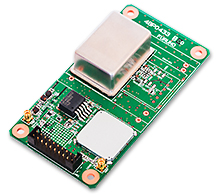Articles for ITS market EV (Electric Vehicle) proposals by country
EV in Europe is quite uncertain
"Shift to EV" became a hot topic in Japan in 2017. A lot of feature articles on EV were promoted in television and economic magazines. Meanwhile, in the background there are EV policies created by each country and region worldwide. For example, both French and British governments have announced their policy which states "Stop selling gasoline and diesel vehicles by 2040". This effectively points toward vehicle electrification. However vehicle electrification does not mean completely EV. It is interpretated as a hybrid car or a plug-in hybrid car combined with an internal combustion engine and electric motor(s).
Meanwhile, Germany, the biggest automobile producer of Europe opposes the French and British policies. Daimler executives said, "It is very difficult at this time to identify the time to abolish gasoline and diesel vehicles, although we are progressing with the EV projects." Daimler plans to launch a new EV brand “EQ” sometime in the 2020s and will introduce EV models targeted at the compact car market.
What do European automobile industry officials ultimately think about EV growth?
In early February 2018 I covered the AABC (International Automobile Battery Conference) Europe 2018, an international conference for electric vehicle batteries held in Mainz, Germany to determine the automotive manufacturer’s true intentions.
AABC originated in the United States and attracted a great deal of attention in the automobile industry during the fourth EV boom around 2010. The current trend in the EV recently shifted and participation is increasing at AABC Europe 2018. More than 950 people gathered from all over the world making it the largest ever.
In conclusion the European automobile industry officials still think EV in Europe is still uncertain.
I mentioned in my recent book "Can Toyota survive in the new era of EV?" The current, fifth EV boom is driven in part by the Volkswagen Group diesel engine computer control fraud problem in 2015. To help restore the corporate image, Volkswagen Group has emphasized "EV shift" in the 2016 medium-term management plan. Considering this Daimler, BMW, Bosch and Continental had no choice but to start collaborating with them. During AABC Europe 2018 I heard many lectures supporting this trend. In other words the EV shift in Europe is really driven by marketing competition and not rapid development of new technology for lithium ion secondary batteries currently used in EV.
In addition the EC (European Commission) presented a speech announcing new CO2 reduction targets of "30 percent by 2030 compared with 2021". It is likely this movement will boost the spread of EV throughout Europe. Currently the EC does not have any momentum to establish a bill restricting the number of EV’s like the California ZEV (Zero Emission Vehicle Regulation) or Chinese NEV (New Energy Vehicle Regulation).
India is aiming at an “EV shift by 2030”
I visited Delhi in India during the following week of travel in Germany to cover the “Auto Expo” held once every 2 years. There were two locations, one is mainly automobile manufacturer exhibits in a suburb of Delhi called “Greater Noida”. The other location is mainly automobile parts manufacturer’s exhibits at a convention center in the center of Delhi city.
The main topic this year was EV. Recently in last year or two an India government official said "All new car sales in India will be EV by 2030". This EV means complete EV (Pure EV) only. Hybrid vehicles and plug-in hybrid electric vehicles are not included. There is no evidence India can meet such a target date, therefore the world automobile industry doubts if India can realize the 2030 date.
Considering this situation the India Automobile Association submitted a proposal regarding EV to the India government in December, 2017. It stated a compliance rate of “40% for EV new car sales and 100% full compliance in EV commercial vehicles”. Even the 100% government target was down to 40% in their latest proposal, however India has very large vehicle market. The scale is 4.1 million and it is listed as the world’s 4th largest, now larger than Germany. Currently India’s population is now 1.3 billion and in 2030 it will surpass China becoming the largest population.
Considering this trend each India automobile company naturally exhibited EV at the Auto Expo. Among them two large India companies, TATA and Mahindra & Mahindra both attracted many individuals attention.
TATA exhibited a full lineup of their EV’s like an EV bus for public transportation and new design EV small trucks. Also their small EV type sport car based on their smart city concept.
Mahindra & Mahindra exhibited an EV tricycle taxi for public transportation, EV platform for C segment and EV tricycle similar to the Toyota super small mobility "i- ROAD”.
Meanwhile the Japanese major companies Toyota and Honda exhibited their existing EV concept models and did not mention EV at any press conferences. One official of the Japanese automotive manufacturers said "Since there are many indefinite elements in the India government EV policy I did not discuss EV at this time.
Multi-Suzuki who has the largest car market share in India exhibited the existing EV concept model. They said, “Hybrid car is the most effective in the India based on their natural environment”. This comment is said to be related to the India government’s income tax hikes for hybrid cars in July 2017.
China seems to be the first priority
As described above I traveled to cover Europe and India in February 2018 and also covered the US in January 2018. I found the most active country for EV was China. In fact the world EV sales for 2017 was 1.4 million with China accounting for half of the sales. In the future the Chinese NEV (New Energy Vehicle Regulation) will be stricter and EV sales in China will continue increasing. I will keep covering the worldwide EV shift.
Writer introduction

Mr. Kenji Momota Automotive journalist
His major is the world automotive industry and he is also familiar with the energy industry, IT and the aging society problem as the related fields. He acts around the world based in Japan and USA and writes for the general magazines, the technology journals and the automotive related media etc.
He is also commentator of motor race and world's motor show on TV program based on his career of the driver of Indy Racing League and NASCAR. In recent years, he has been covering about a paradigm shift from developed countries to developing countries, the motorized vehicle like EV and the telematics.
FURUNO ITS Journal
Click here for the latest articles after 2022 (in Japanese)2022
- The "realistic" self-driving roadmap shown by the Japanese government and a hands-on report on the latest Subaru EyeSight X
- Will FCVs (Fuel Cell Vehicles) Become Popular? ~New Movement in Toyota and Honda~
- The 'Complete' online sales of new cars start in Japan. Will this new way of buying cars take root?
- Many Firsts! On-Site Report from Tokyo Auto Salon 2022 - The author, who knows what goes on behind the scenes, looks back on 40 years of history. -
2021
- "Moving toward zero traffic fatalities for four-wheeled and two-wheeled vehicles globally in 2050" ~Experience on Honda's latest safety technologies~
- Tsuneishi Shipbuilding's building and DX, an exclusive visit to the main factory
- Japan's Smart City: New Moves toward Practical Use
- When will self-driving buses (service cars) be put to "full-scale" practical use?
- Utilization vehicle data during disasters
- Toyota-led Connected Technology to Transform Commercial Vehicle Business -From light trucks to large trucks and buses-
- Toyota enters the connected car "Personalization" business
- Japanese automakers' carbon-neutral strategies swept up in ESG investment
- Drive experience of the latest autonomous vehicle models and advanced driving support systems
- Will carbon neutrality accelerate the trend to strengthen LCA (Life Cycle Assessment)?
- Semiconductor shortage exposes realities of the automotive industry
- Online Autonomous Driving Contest Enhancing development of Human Resources
2020
- What happens to CASE when gas cars are banned in Japan?
- When will Flying Cars be launched?
- Expectation vs. reality:Autonomous Driving in Japan
- V2X, Becoming increasingly important in autonomous driving
- Technology of Subaru “EyeSight X”
- Lifestyle-oriented French cars gain popularity in Japan
- Human-oriented smart cities are wanted
- MaaS and CASE, how would automotive industry change after COVID-19?
- The beginning of virtualization era, triggered by COVID-19
- Trend of EV shift and consumer demands
- TOYOTA Press conference about ADAS - Releasing algorithm for "sudden acceleration suppression during attempted sudden acceleration" free of charge -
- The Japanese automotive industry in 2020 - 3 turning points -
- "Using a smartphone while driving" and "Level 3 automated driving"
2019
- Motor show business model is at a turning point - Tokyo Motor Show Report -
- Commercialization and monetization of MaaS - ITS World Congress Singapore Report -
- Android Automotive pays attention to V2X - Report from the Frankfurt Motor Show 2019 in Germany -
- Automobile Distribution Revolution and DCM (Data Communication Module)
- Connected business potential and newly proposed "eMaaS" by Honda
- 5G services for practical use are multiplying
- Connectivity technologies attracting attention due to frequent traffic accidents
- Shanghai Motor Show report -SUV, EV, Automated car & 5G-
- Drone Business roadmap and updates to Michibiki (Quasi-Zenith Satellite System)
- MaaS (Mobility as a Service) "town development." Full-scale promotion for a national project
- CES organizer states "Data Period in 2020s." Transformation of the Automotive Industry in CES, US "-CES2019 Report-"
- "Return to Origin" directed towards the age of change, automatic operation and connectivity
2018
- New proposal for Private Car Automated Driving Level and other Hot 5G Technology Topics
- Standardized EV charging infrastructure concerns in Europe, US, Japan and China - Kobe EVS 31 field report -
- Touring a pure car carrier and a test drive of the latest hybrid car
- Planning stage products are exhibited at the newly established visualized mobility service "TOYOTA MOBILITY SHOWROOM".
- Potential “Community Car-share” program promoted by local residents
- CES Asia Report 2108
- Companies attempt new Vehicle-to-Infrastructure communications, including traffic volume measurements and vehicle positioning. -ITS Asia Pacific Forum in Fukuoka-
- Geneva show in Switzerland. Flying cars and MaaS (Mobility as a Service) were hot topics.
- EV (Electric Vehicle) proposals by country
- MaaS competition through service mobilization, M & A and technical field collaboration is accelerating. - The CES 2018 Report -
2017
- Big data’s initiative and fight for the automotive industry. Cooperation among companies becomes increasingly important.
- Connected car and road-to-vehicle communication automatic operation
- ETC (Electronic Toll Collection) and ETC2.0. Current situation and projected future
- Rapid development of sharing economy
- Germany is first to recognize level 3 automated driving
- ITS EU 2017 Field Reports -Automatic Operation and the eCall-
- From Infotainment to ITS, the competitive area is spreading in the car big data industry.
- GTC (GPU Technology Conference) Report and the de facto standardization of AI (artificial intelligence)
- Renesas' new challenge! "e-AI Solution" and "Renesas Autonomy"
- The Automobile industry is shifting from a manufacturing industry to a service industry.
- The movement toward accident countermeasures for aging drivers in Japan
- Fusion of ride sharing and fully automated driving is advancing in the USA.
2016
- Overview of the Quasi-Zenith Satellite System (QZSS) and advancements toward full-scale practical use including the Tokyo Olympic Games - G-space EXPO 2016 report-
- Japan’s automated driving project "SIP-adus" will be a large demonstration experiment.
- The International Home Care & Rehabilitation Exhibition. There were many car manufactures with exhibits booths at this show.
- Japanese car manufacturers starting to concentrate on strengthening the ADAS system
- A new movement of legislation for autonomous cars
- Cyber Security and “AGL”, the new OS for automotive are hot topics in the connected car industry
- “High precision 3D map” the key future of autonomous car and pedestrian dead reckoning
- Chinese “BAT” is accelerating their business in the EV (Electric Vehicle) market
- Tesla's original connection to Taiwan and the new transportation system technologies.
- "The main topic" of the Geneva Motor Show was how to strengthen "pedestrian protection"
- The probe data business is getting more competitive
- Reporting directly from the 2016 CES show "Data services will soon become the main revenue source of automotive industry"
2015
- Do the automated driving systems need the GNSS (Global Navigation Satellite System) ?
- ETC Version 2.0 is coming soon. A new service was announced at the Tokyo Motor Show and the possibility that is could be used as a device for older drivers.
- "Connected Horizon" and "eHorizon". Germany's leading parts supplier accelerates strengthening of "Big Data" for business



 AABC Europe2018 held at Germany Mainz.
AABC Europe2018 held at Germany Mainz.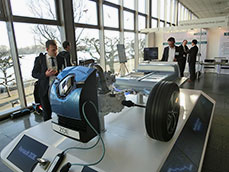 Renault ZOE electric parts exhibited at AABC Europe
Renault ZOE electric parts exhibited at AABC Europe Tata at Autoexpo 2018. EV sports car and EV bus exhibition.
Tata at Autoexpo 2018. EV sports car and EV bus exhibition.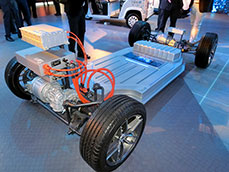 Mahindra & Mahindra’s EV platform.
Mahindra & Mahindra’s EV platform.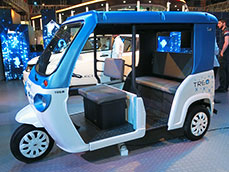 Mahindra & Mahindra’s EV tricycle
Mahindra & Mahindra’s EV tricycle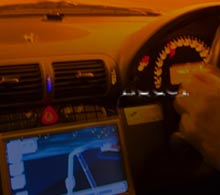 GPS/GNSS Receiver&Chips and Modules (positioning and timing)
GPS/GNSS Receiver&Chips and Modules (positioning and timing)